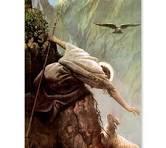
It is interesting that Jesus chose to describe himself as a shepherd. In his day shepherds were often ranked as low as tax collectors. In the time of the patriarchs they were highly regarded but during their sojourn in Egypt the Israelites took on the values of that country. The Egyptians were agricultural people and looked down on shepherds. Yet throughout the bible God is depicted as a shepherd.
The leaders of the Jews - the scribes, pharisees and chief priests - seem on the whole to have been self-seeking, and provided very poor leadership. They looked down upon people whom they classed as sinners. Jesus, on the contrary, sought the company of those who were so marginalised. They were his lost sheep (Luke 15:3-7). He made a point of eating with them and earned the criticism of the pharisees (Matt. 9:11-13). He always wanted to provide new opportunities for the fallen. He called the tax collector Matthew to be an apostle, which meant that his life was changed from exploitation to service. “He leadeth me to green pastures.” (Psalm 23:2)
Feeding the sheep is an important part of the shepherd’s job. Jesus commanded Peter to “feed my sheep” (Jn 21:17). The shepherd knows the kind of grass his sheep need, and is careful to make sure they do not eat plants that are poisonous. It is an image of the Good Shepherd who declared: “I am the way, the truth and the life" (Jn 14:6).